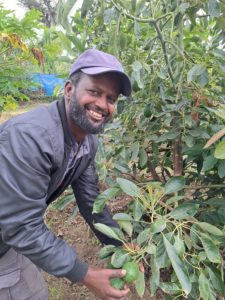
Agriculture is the backbone of Ethiopia’s economy, contributing to 34.5 percent of GPD in 2020. Smallholder farming accounts for approximately 95 percent of agricultural production and 85 percent of total employment[1].
Mr Qumbii Qilxuu is from a farmers’ family and before starting his own production of fruit and vegetables, he was a daily worker for local farmers in the Bishoftu area. Currently, he has two hectares of land for fruit and vegetables, as well as cattle fattening and poultry. He lives on the farm with his wife and two young children.
He started producing fruit with 55 heads of avocados which started producing after three years. Currently, he is cultivating avocado, banana, papaya, coffee, watermelon, head cabbage, broccoli, and red onion.
Qumbii’s integrated farming system includes poultry, cattle fattening, and modern beehives. Together with his community, they have installed 110 modern beehives near his farm.
For fruit and vegetables, he is currently applying two methods: conventional farming for his vegetables that grow on Chelekleka lake during the dry season and organic farming for his fruit trees that are on a separate piece of land. He is using cow and chicken manure, rich in nutrients such as nitrogen, phosphorus and potassium.
In April 2024, Qumbii attended a three-day workshop on soil fertility management, compost and irrigation water management facilitated by Bishoftu Polytechnic College and funded by the Green Flower Foundation. He learnt how to prepare compost from the available inputs from this farm.

Currently he has 8 permanent workers on his farm, but regularly hires daily workers to fill the labour gaps. In the agricultural sector, planting, harvesting, and tending to crops are labour-intensive tasks. Farmers and farmworkers invest considerable time and energy to ensure bountiful harvests.
Farmers had been using traditional systems of fallowing, crop rotations, manure and wood ash to maintain soil fertility and crop yields. However, many of these traditional means of land management were dismantled over the course of the past two centuries[2]. Through short-term training, we are revitalising these traditional systems with added information on organic horticultural practices.
Qumbii’s plan for the future, is to continue developing his organic production, cattle fattening and poultry production. His short-term project is to purchase machines that will enable him prepare fodder for his poultry and cattle.
The Green Flower Foundation has been promoting organic farming in Ethiopia through vocational training since 2018. Through our work with the Ministry of Agriculture, organic farming was added to the curriculum in agricultural Technical and Vocational Education and Training (TVET) centres in the country. So far, 36 students have taken the 3-year course, a new cohort of 18 students have started the same course, and GFF have contributed to providing short-term courses up to 100 farmers.
[1] https://www.fao.org/in-action/scala/countries/ethiopia/en
[2] https://futureoffood.org/insights/sustainable-development-isd/
